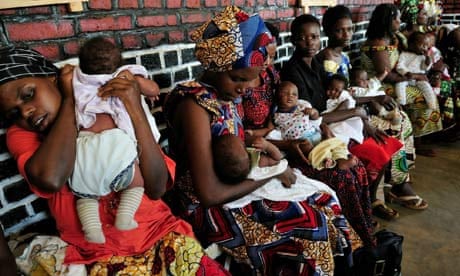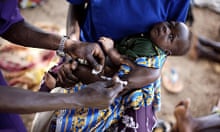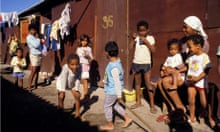Britain will lead the fight against malaria, one of the world's biggest killers of children, the deputy prime minister, Nick Clegg, will tell a UN summit in New York.
Clegg will announce an increase in UK funds for malaria from £150m a year to £500m by 2014 in his closing speech to world leaders discussing progress towards the millennium development goals today.
He will pledge to halve deaths from the disease in 10 African countries.
The UK government is pushing for greater efforts in two areas: the health of women and babies, which will be the subject of a strategy launched by the UN secretary general, Ban Ki-moon, and malaria, which takes a big toll on both.
"In Africa, a child dies from this disease – this easily preventable disease – every 45 seconds," Clegg will tell the summit. "So we will make more money available, and ensure that we get more for our money, with the aim of halving malaria deaths in 10 of the worst affected countries."
One of the countries that will benefit from greater UK efforts to fight the disease is Zambia, where the government estimates 5,500 children a year would be saved by increasing access to malaria prevention, diagnostics and treatment. Another is Ghana, where the UK will supply 2.4m new bed nets, estimated to be enough to save 13,000 lives a year.
The coalition has protected international development spending, and repeatedly promised that it will increase to 0.7% of gross national income by 2013. But at a time of tough spending cuts, polls show there is not great public support for more aid spending.
George Osborne said the government was committed to new spending on malaria. The chancellor travelled to Uganda in 2007 and said that since "witnessing this terrible disease at first hand, I have been determined to do all I could to help the battle against malaria. I made the pledge then that when we formed a government we would increase spending on malaria. Today we have honoured that pledge."
The international development secretary, Andrew Mitchell, condemned "the outrageous failure to prevent 25,000 people dying every day from diseases we have the power to prevent". Britain had led efforts to make the fight against malaria one of the main outcomes of the summit, he said. "The unremitting nature of the fight against malaria, saving lives lost needlessly, is absolutely fundamental."
Mitchell has talked at every engagement over the past two days of the summit about getting better value for money for aid. On malaria, too, he said, Britain could get "more bang for the bucks" by focusing on areas of greatest prevalence.
"Tackling malaria will mean that millions of people, and especially children, will be saved from its crippling effects … Combating this disease is also one of the best investments money can buy – as little as £2 a year can be enough to save a child's life," Mitchell said.
Mitchell and Clegg have promised to reorient the Department for International Development's programmes to ensure each has the health of women and children at its heart. A review is looking at how aid money is spent. Exactly how the new funds for malaria will be used will be decided when that is complete, probably by March.
Mitchell, Clegg, the US secretary of state, Hillary Clinton, Australia's foreign minister, Kevin Rudd, and Melinda Gates, on behalf of the Gates Foundation, will announce a new alliance to focus on the health of mothers and children, which will begin by helping developing countries increase access to contraception and reproductive health advice.
Mitchell said: "It is outrageous that 76% of women in sub-Saharan Africa don't have any access to contraception."
Unwanted pregnancies are a huge burden on families as well as a health risk for women, and lead directly to deaths when women seek backstreet abortions, since terminations are not legal or readily available in many developing countries.
Mitchell told of visiting a contraception clinic in Rwanda funded by the Conservative party. A woman with four children came in because she was afraid she was pregnant. When the test showed she was not, said Mitchell, "she was crying, she was dancing, she had her arms in the air. Women are flooding into this clinic."
Niger, he said, had a population of three million a few years ago. By 2050, that is set to rise to 53 million. "It is one of the poorest countries in the world … deeply food-insecure, economically insecure and politically insecure."
It was, he added, "an international scandal that more than 350,000 women die in the developing world every year from complications in pregnancy or childbirth that can be easily prevented".
And across town ...
Not only has the United Nations brought together leaders from more than 140 countries along, of course, with their entourages, security and dietary needs Bill Clinton, no stranger to this sort of excitement, is hosting a party too. The Clinton Global Initiative is holding its annual meeting to coincide with the UN summit on the Millennium Development Goals.
It makes absolute sense. The CGI is in the business of collecting the richest, most famous and powerful people on the planet and then persuading them to do something useful for the poorest. Much easier to get world leaders along when they are in town for another gig already.
But the two events are like champagne and gripe water. One is has froth and a feel-good factor, while the other is meant to benefit babies but has a distinctly medicinal flavour.
Over at the UN, where several blocks are no-go areas not only for cars but any pedestrians without a UN security pass, the world leaders make set-piece speeches to appeal to their own people while attempting to move further on their 2000 commitments on alleviating world poverty, ill-health and poor education. It's heavy stuff, with the odd surreal moment as a leader like President Ahmedinejad takes to the podium.
Over at the Sheraton New York and Towers, the same leaders (though Iran's president has not been spotted) rub shoulders with the world's leading businessmen and billionaires galore. Hillary Clinton is of course there, as are Melinda and Bill Gates. But so is Laura Bush and Cherie Blair, Richard Branson and Lance Armstrong, Chad Hurley who co-founded YouTube and Eric Schmidt, CEO of Google and Jeyy Yang, co-founder of Yahoo. So are Muhtar Kent, CEO of Coca-Cola and Robert McDonald, CEO of Procter and Gamble. And, of course, the closing speeches on Thursday will be made by Barack and Michelle Obama.
It's nothing like UN summitry. It's more like one of those game shows. Bill Clinton takes the stage, mellow as always, and calls up those people who have cleverly distinguished themselves from all the other billionaires by committing themselves to action for the poor, and they get adulation. It's not necessarily just about philanthropy but about business. This is the way the private sector does development. With an initiative (launched by Hillary Clinton) to market clean cookstoves that could sell for $25 and save women and children (and the planet) from smoke or with little packets of water purification chemicals or solar panels.
It's very different from the UN show but in New York there is room for both, except on the roads.






